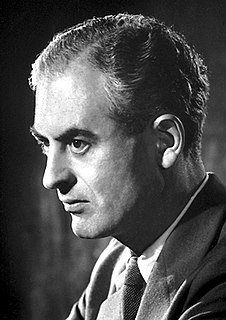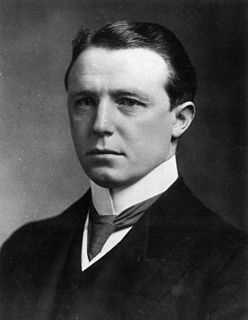Related Research Articles

Sir Peter Brian Medawar was a British biologist and writer, whose works on graft rejection and the discovery of acquired immune tolerance were fundamental to the medical practice of tissue and organ transplants. For his scientific works he is regarded as the "father of transplantation". He is remembered for his wit both in person and in popular writings. Famous zoologists such as Richard Dawkins referred to him as "the wittiest of all scientific writers", and Stephen Jay Gould as "the cleverest man I have ever known".

Nikolaas "Niko" Tinbergen was a Dutch biologist and ornithologist who shared the 1973 Nobel Prize in Physiology or Medicine with Karl von Frisch and Konrad Lorenz for their discoveries concerning organization and elicitation of individual and social behavior patterns in animals. He is regarded as one of the founders of modern ethology, the study of animal behavior.

Sir Peter Mansfield was an English physicist who was awarded the 2003 Nobel Prize in Physiology or Medicine, shared with Paul Lauterbur, for discoveries concerning Magnetic Resonance Imaging (MRI). Mansfield was a professor at the University of Nottingham.

Brenda Milner, is a British-Canadian neuropsychologist who has contributed extensively to the research literature on various topics in the field of clinical neuropsychology, sometimes referred to as "the founder of neuropsychology". As of 2010, Milner is a professor in the Department of Neurology and Neurosurgery at McGill University and a professor of Psychology at the Montreal Neurological Institute. As of 2005, she holds more than 20 degrees and continues to work in her nineties. Her current work explores the interaction between the brain's left and right hemispheres. Milner has been called the founder of neuropsychology, and has proven to be an essential key in its development. She received the Balzan Prize for Cognitive Neuroscience, in 2009, and the Kavli Prize in Neuroscience, together with John O'Keefe, and Marcus E. Raichle, in 2014. She turned 100 in July 2018 and at the time was still overseeing the work of researchers.

Sir William Richard Shaboe Doll was a British physician who became an epidemiologist in the mid-20th century and made important contributions to that discipline. He was a pioneer in research linking smoking to health problems. With Ernst Wynder, Bradford Hill and Evarts Graham, he was credited with being the first to prove that smoking caused lung cancer and increased the risk of heart disease. He also carried out pioneering work on the relationship between radiation and leukaemia as well as that between asbestos and lung cancer, and alcohol and breast cancer. On 28 June 2012 he was the subject of a series on Radio Four called The New Elizabethans, a programme broadcast to mark the Diamond Jubilee of Queen Elizabeth II, dealing with 60 public figures from her reign.

Sir Almroth Edward Wright was a British bacteriologist and immunologist.

Rajendra 'Raj' Persaud is an English consultant psychiatrist, broadcaster and author of books about psychiatry. He is known for raising public awareness of psychiatric and mental health issues in the general media, has published five books and received numerous awards.
Hugh Esmor Huxley MBE FRS was a British molecular biologist who made important discoveries in the physiology of muscle. He was a graduate in physics from Christ's College, Cambridge. However, his education was interrupted for five years by the Second World War, during which he served in the Royal Air Force. His contribution to development of radar earned him an MBE.
Sir John Fraser, 1st Baronet, FRSEd was Regius Professor of Clinical Surgery at Edinburgh University from 1925 to 1944 and served as principal of the University of Edinburgh from 1944 to 1947.

Uta Frith is a German developmental psychologist working at the Institute of Cognitive Neuroscience at University College London. She has pioneered much of the current research into autism and dyslexia, and has written several books on the two subjects. Her book Autism: Explaining the Enigma introduces the cognitive neuroscience of autism. Among the students she has mentored are Tony Attwood, Maggie Snowling, Simon Baron-Cohen and Francesca Happé.

Dame Sheila Patricia Violet Sherlock FRCP FRCPE FRS HFRSE FMGA FCRGA was a British physician and medical educator who is considered the major 20th century contributor to the field of hepatology.
Ernest Sheldon Friel, was an Irish dentist who was the first specialist orthodontist to practise in the United Kingdom of Great Britain and Ireland, and the second in Europe, going on to become the first Professor of Orthodontics in Europe. His obituary in The Journal of the Irish Dental Association described him as the most distinguished dentist that Ireland had ever produced.
Sir Victor Ewings Negus, MS, FRCS was a British surgeon who specialised in laryngology and also made fundamental contributions to comparative anatomy with his work on the structure and evolution of the larynx. He was born and educated in London, studying at King's College School, then King's College London, followed by King's College Hospital. The final years of his medical training were interrupted by the First World War, during which he served with the Royal Army Medical Corps. After the war, he qualified as a surgeon and studied with laryngologists in France and the USA before resuming his career at King's College Hospital where he became a junior surgeon in 1924.
Francis Arthur Powell Aveling DD D.Sc PhD DLit MC ComC was a Canadian psychologist and Catholic priest. He married Ethel Dancy of Steyning, Sussex in 1925.

Sir Francis Gordon Bell, FRCS, FRCSEd, FRACS was a New Zealand surgeon who was professor of surgery at the University of Otago at Dunedin. He was a founder member of the Royal Australasian College of Surgeons and was elected its president in 1947. In the 1953 Coronation Honours, Bell was appointed a Knight Commander of the Order of the British Empire.
The Raymond Horton-Smith Prize is a prize awarded by the School of Clinical Medicine, University of Cambridge for the best thesis presented for MD degree during the academical year. Known as the prize for the best MD of the year, it should be awarded annually but from time to time it has not been awarded for some years. Often the prize has been considered to have a high prestige value since it has encouraged the Doctor of Medicine graduates (MD) of the world-renowned university to write the best thesis among them.
Douglas Montagu Temple Gairdner FRCP was a Scottish paediatrician, research scientist, academic and author. Gairdner was principally known for a number of research studies in neonatology at a time when that subject was being developed as perhaps the most rewarding application of basic physiology to patient care, and later his most important contributions as editor, firstly editing Recent Advances in Paediatrics and then of Archives of Disease in Childhood for 15 years, turning the latter into an international journal of repute with its exemplary standards of content and presentation.

Sir Peter John Ratcliffe, FRS, FMedSci is a British Nobel Laureate physician-scientist who is trained as a nephrologist. He was a practising clinician at the John Radcliffe Hospital, Oxford and Nuffield Professor of Clinical Medicine and head of the Nuffield Department of Clinical Medicine at the University of Oxford from 2004 to 2016. He has been a Fellow of Magdalen College, Oxford since 2004. In 2016 he became Clinical Research Director at the Francis Crick Institute, retaining a position at Oxford as member of the Ludwig Institute of Cancer Research and Director of the Target Discovery Institute, University of Oxford.

George Harley was a Scottish physician.

Ernest Francis Bashford was an influential British oncologist who pioneered the biological approach to the study of cancer.
References
- ↑ "Universities and Colleges". The British Medical Journal. 1 (3190): 293. 18 February 1922. PMC 2415650 .
- 1 2 "Universities and Colleges" (PDF). The British Medical Journal: 1391. 4 June 1910. PMC 2331880 . Retrieved 29 January 2010.
- ↑ Raymond B. Cattell (October 1941). "Francis Aveling: 1875-1941". The American Journal of Psychology. University of Illinois Press Stable. 54 (4): 608–610. JSTOR 1417217.
- ↑ "Looking Back". The Psychologist. 21: 86–87. Archived from the original on 17 April 2014. Retrieved 31 January 2012.
| This science awards article is a stub. You can help Wikipedia by expanding it. |